Chris Baty's Blog, page 55
July 6, 2020
Resources to Help Your Novel Writing Process
Every year, we’re lucky to have great sponsors for our nonprofit events. Today, The Great Courses Plus, a NaNoWriMo 2019 sponsor, is here with some tips to help guide you through the novel-writing process in November:
Just like the novel itself, the process of writing a novel always has a beginning, a middle, and a conclusion. And The Great Courses Plus is here to help with every stage of novel writing you take on.
In the Beginning…We need ideas and inspiration. We have to invent our characters, plot out how we think the story will unfold, and entertain no less than 50,000 potential plot twists—because at the beginning, anything can happen.
Once we have those ideas, getting them all together and organized into a readable story structure is as big of a challenge as putting together the right words to craft that ever-vital first sentence.
The Great Courses Plus is one of our Camp NaNoWriMo 2020 sponsors! We’d like to resurface these great resources for the writing process that they shared with us last fall.
July 3, 2020
Why Worldbuilding Is the Key to Your Novel’s Success
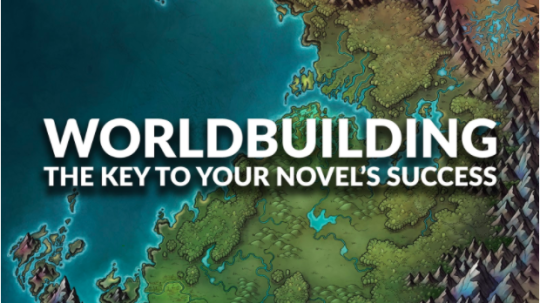
Every year, we’re lucky to have great sponsors for our nonprofit events. Today, Janet Forbes, author and CEO of World Anvil, shares how good worldbuilding can help your novel take off. World Anvil is a Camp NaNoWriMo 2020 sponsor.
In Jaws, a team goes up against a man-eating shark. And in the 10th century epic Beowulf, a legendary hero battles a terrifying monster. Although these stories feel very different, at their core, they are exactly the same story: Overcoming the Monster. What’s different is the setting, the characters, and the monster itself. In other words—the worldbuilding. And it’s the key to your novel’s success, too!
The three core elements of a story are setting, character, and plot. Setting is the most obviously related to worldbuilding. From Middle Earth to the USS Enterprise, setting is an instant key to tone and mood, genre, and the core uniqueness of your novel.
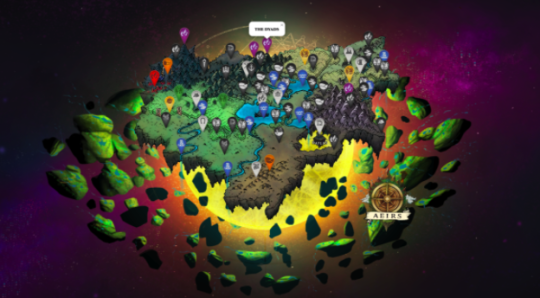
But consider Character. Characters are shaped and moulded by the worlds they grew up in. Their beliefs and taboos, their training, the skills they’ve developed—they’re all defined by the world they find themselves in. For example, Superman’s extra-terrestrial origins are both his strength and his weakness, as well as his core character insecurity—he will always be an outsider, a literal alien.
As for the third, Plot? Plots are driven by conflict. And conflicts are born of politics, religion, magic, resources, and history—in other words, worldbuilding.
How can worldbuilding keep your novel on track?If you’re struggling to find your plot, turn to your worldbuilding. What’s going on in the wider world, and how does that affect your characters? Whether your character is going up against a villain, society, supernatural forces, or even technology, worldbuilding will help you turn them into a developed conflict for your novel.
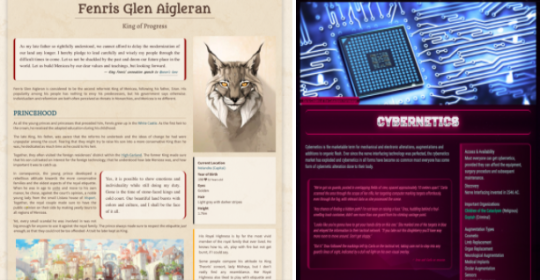
(Left): Character Profile: Fenrise Glen Aigleran by Happy (Right): A primer on Cybernetics by Tobias Linder
If you want to create deeper villains, build out their past experiences, their training and the institutions where they trained, their traumas and their triumphs. How have those scarred and formed your character? What bonds tether your character to people, places and things within your world? And what will they do to protect them?
Creating heroes can be done in the same vein. Reveal their insecurities, their struggles, their vulnerabilities, and show their basis in the way the world has treated them—and perhaps still does. It’s a sure way to help your readers sympathize with your characters.
How do you keep track of your worldbuilding?Three years ago, I was struggling to get my first novel off the ground. And it was keeping track of the worldbuilding which was getting me stuck! It just seemed so big, and so unwieldy. My husband, Dimi, created something for me: a place to track, link, and store my worldbuilding. We put it up online when our close friends said it might be helpful for others… and after a month 10,000 people were using it! After almost three years, our community—which is, by the way, one of the friendliest places on the internet!—has grown to almost a million writers, including bestsellers like Brian McClellan and Chris Fox, and a host of publishing companies too.
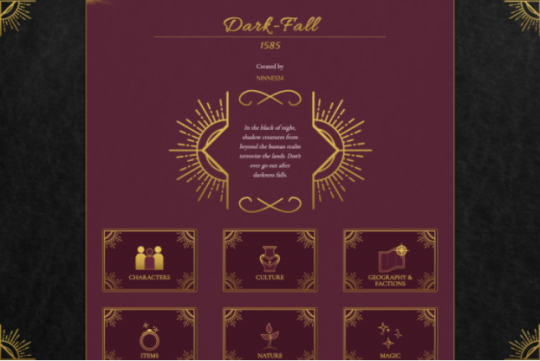
From in-depth character profiles to family trees, timelines, interactive maps, and articles you can link together, World Anvil has everything you need to build your world. Our worldbuilding templates are filled with genre-neutral prompts to inspire you! And you can now write your novel there too, in our new novel writing software! When you’re done, either export it, or host it on the World Anvil platform.
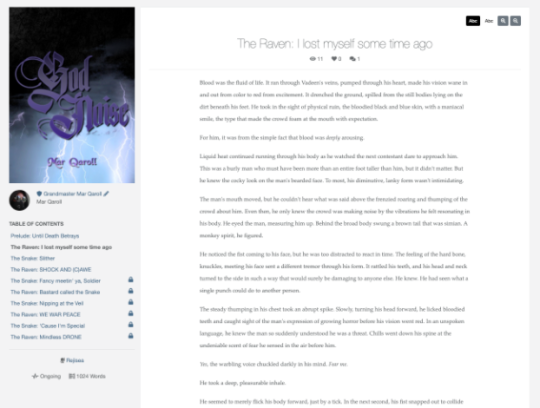
Write and host your novel on World Anvil too! Locking chapters sends readers to your store or Patreon to buy access and support you!
For those building an author career, World Anvil helps you with every step. Advanced accessibility features allow you to keep your world private, share it with a select few, or show it to everyone. And you can monetize your way, with Kofi & Patreon or your own shop-front! Most importantly, you can build an author platform and keep your fans hooked on your writing. Dimi and I are all about lifting authors up. For those in our professional tier, we’ll support your work, and spotlight and feature you within the community!
To learn more about World Anvil and join our incredible community, go to World Anvil.com and create your free account. And if it looks like it’s for you, use the code CAMPNANO on check out (click the blue text on the payment window) for 25% off Master, GrandMaster, and Sage tier memberships of 6 or 12 months!
I hope you have an AWESOME Camp NaNoWriMo, whatever your goals. Happy writing and worldbuilding!
—Janet
P.S. If you want more articles and advice like this, check out our blog and our youtube channel!

Janet Forbes (pen name J.D. Blythe) is a published author and the CEO of World Anvil, the ultimate worldbuilding and novel writing platform! World Anvil helps you organize, store and track your worldbuilding as you’re writing your novel. Our novel writing software, accessible from anywhere, integrates stunningly with your worldbuilding. And when it’s time to publish, you can export, or publish directly on the World Anvil platform and monetize YOUR way! Check it out at World Anvil.
July 2, 2020
Camp Pep: Quick Tips to Get Your Story Started!

Camp NaNoWriMo has begun! If you haven’t started your project yet, don’t worry—you’ve still got plenty of time to write this month. If you need a helpful nudge to start, young writer Diya A. is here with some tips:
So, Camp NaNoWriMo is here! I’m sure everyone has at least one idea that’s itching to be on paper. Something really good. But maybe you don’t know what to write. This has happened to me so many times. I like to call it pre-writer’s block. Luckily, as I have written more and more stories, I have found more and more tips and tricks to turn the idea in your head into a fully fledged novel in no time!
1. The PlotLet’s take the idea that’s in your mind and put it on paper. Literally. Describe your story in 2-3 sentences, sort of like a summary of your whole book rather than a blurb. This way, if you get stuck when you are drafting your book, you can refer to these sentences to keep you on track. Here’s one of mine:
A teenage boy finds his childhood hero, Raymond Bain, stuck in his closet. His only goal: to get Raymond out of there before anyone sees him.
It’s not very good, but it makes sense, and now I know what my plot is and how I can make it more interesting.
2. Character DevelopmentYou probably have at least one character in mind, along with some characteristics in mind. Now, when I am at this stage, I like to draw out a character plan. I usually try to answer these questions:
What is this character’s full name?Where are they from?What are their pet peeves?What are their strengths?Who is their family?…and so on. You can go really in depth with everything or you can just make a brief overview of the character. This helps me a lot during the first 2 or 3 chapters, when I’m not sure who the character is just yet.
3. Drafting ChaptersNow, similar to the first trick, we can do the same thing for each chapter. It doesn’t really matter how long the chapters will be, you can still summarize them easily. For example, using the same example for the first step, I could sum up my first chapter like this:
Davis (the teenage boy), learns that his childhood hero has gone missing (Raymond Bain) and the police can’t find him (watches this on the news). He walks up to his room to get ready for school when he finds Raymond in his room. (end on cliffhanger)
You might have noticed that I have used some brackets for some notes. This helps me plan out my chapters even better. Planning out your story will make your writing process easier.
Another way you can plan out your story is by using the Novelist Workbooks from the YWP Learning Resources page! Just choose your level and download the PDF. I used this for NaNoWriMo last year and I’m using it for Camp NaNoWriMo this month.
Hopefully I have given you some useful tips and tricks to help you plan and write an awesome story for Camp NaNoWriMo!

Spending her whole life exploring the world, Diya A. is an avid writer, artist, dancer, singer, and more, who likes writing short stories about absurd things from her bed in Finland. Currently in 7th grade at the International School of Helsinki, she expects to finish her novella by the end of the summer. Diya hopes to study medical research and neurology in the future, but that’s a long time away.
Top photo by Ben Duchac on Unsplash
“There have been times when I have repeatedly restarted a...
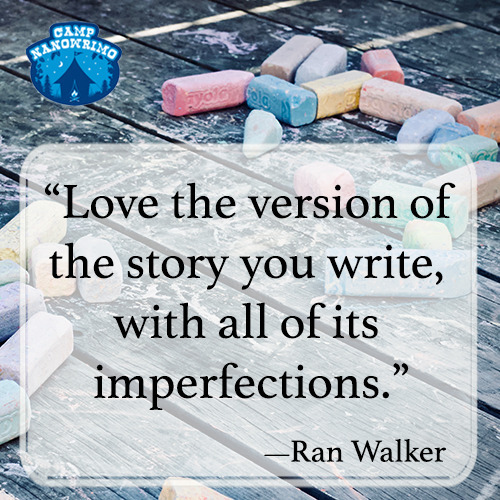
“There have been times when I have repeatedly restarted a project. Why? It didn’t feel as perfect as I had imagined it would be. The reality is that the story in your head and the story on the page will rarely be identical.
Write that ‘perfect’ story the best way you know how, and be okay with the differences between the real and the ideal. Over time, I have come to realize that you have to love the version of the story you write, with all of its imperfections. Maybe you will edit your story closer to that ideal. Maybe not. But cherish the story—because it comes from you.”
—Ran Walker is the author of twenty-one books and is the winner of the 2019 Indie Author of the Year and 2019 BCALA Fiction Ebook Awards. He currently serves on the faculty of Hampton University, where he teaches creative writing. Thank Ran for his #CampCarePackage on Twitter, and check out his books on Bookshop.
Your Camp Care Package is brought to you by Camp NaNoWriMo. Sign up to receive more Camp Care Packages at nanowrimo.org!
Background quote image by Jelleke Vanooteghem on Unsplash.
July 1, 2020
Camp NaNoWriMo Begins Today!

Camp NaNoWriMo is your online writers’ retreat, designed to help you set and reach your personal writing goals. Join us for your next writing adventure!
For those of you who have participated before, Camp NaNoWriMo looks a little different this year, as we’re hosting it on the new nanowrimo.org site. But the gist of it remains the same: set your own writing goals, join an online writing group, and give yourself a creative retreat this spring!
How can I participate in Camp NaNoWriMo?To participate in Camp NaNoWriMo, just announce a project, then make sure to check “Associate with a NaNoWriMo event”, and select the current Camp NaNoWriMo event.Once you’ve done that, you should be ready to start tracking your project! You’ll be able to start tracking your writing at 12:01 AM on July 1 in your time zone!Once you’ve reached your writing goal, the site will automatically confirm your win, and you’ll receive a certificate celebrating your achievement, along with a bunch of other winner goodies!What’s happening at Camp?June 30, 2020
We’ve loved celebrating Pride Month with you this June! But just...
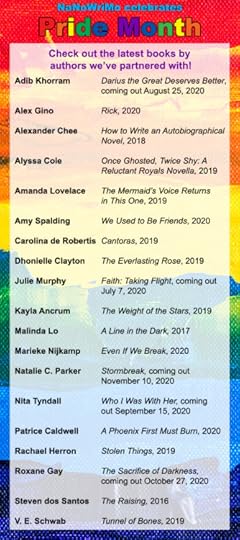
We’ve loved celebrating Pride Month with you this June!
But just because the month is coming to an end doesn’t mean that the celebrations have to stop. (It’s also worth noting that we celebrate Pride in June because our organization is based in the U.S., but many other countries’ Pride celebrations occur in other months.)
We’ve compiled this (incomplete) list of authors we’ve partnered with—including NaNo Coaches, Camp Counselors, and Pep Talkers—who identify as members of the LGBTQ+ community and/or feature LGBTQ+ characters in their novels. If you’d like to support these authors, buy a copy of their latest book (or check out the e-book from your library). Links to the authors’ websites below.
We’re also supporting the LGBTQ+ authors in the NaNoWriMo community year-round with a brand new private forum group specifically for LGBTQ+ writers!
Image description:
Graphic with a background of rainbow paint titled, “NaNoWriMo Celebrates Pride Month: Check out the latest books by authors we’ve partnered with!”
Adib Khorram —Darius the Great Deserves Better, coming out August 25, 2020Alex Gino — Rick, 2020Alexander Chee — How to Write an Autobiographical Novel, 2018Alyssa Cole — Once Ghosted, Twice Shy: A Reluctant Royals Novella, 2019Amanda Lovelace — The Mermaid’s Voice Returns in This One, 2019Amy Spalding — We Used to Be Friends, 2020Carolina de Robertis — Cantoras, 2019Dhonielle Clayton — The Everlasting Rose, 2019Julie Murphy — Faith: Taking Flight, coming out July 7, 2020K. Ancrum — The Weight of the Stars, 2019Malinda Lo — A Line in the Dark, 2017Marieke Nijkamp — Even If We Break, 2020Natalie C. Parker — Stormbreak, coming out November 10, 2020Nita Tyndall — Who I Was With Her, coming out September 15, 2020Patrice Caldwell — A Phoenix First Must Burn, 2020Rachael Herron — Stolen Things, 2019Roxane Gay — The Sacrifice of Darkness, coming out October 27, 2020Steven dos Santos — The Raising, 2016V. E. Schwab — Tunnel of Bones, 2019
Background graphic photo by Steve Johnson on Unsplash.
June 26, 2020
My Art Will Go On

For some of us, the idea of setting and consistently completing a daily word count goal in the middle of all that’s happening right now might seem overwhelming. However, Wrimo Mackenzie Bitz found that creating a daily writing routine could be be used as a way to find a sense of stability while surrounded by chaos.
Before the Coronavirus spread, I had two jobs, a boyfriend, and a one-bedroom apartment. But once it was declared a pandemic, I lost one of my jobs, my boyfriend and I broke up, and I moved across two states to live with my family. Despite a difficult move, a great loss of income, and a break-up, I wrote 1,000-2,000 words every day. But this was a habit which took several weeks to implement back when I first successfully completed NaNoWriMo in 2018. That process began with planning a schedule.
With a certain word count established as a goal, I create my schedule by deciding when I will wake up, how long it takes me to function, and what other responsibilities I have to handle throughout the day. While focusing on graduate applications, a big move, and emotional issues, I lowered my word count from 2,000 words to 1,000 words. Prior to these events, 2,000 words was a doable task for me, but I had to step back and evaluate my mental health in relation to my responsibilities and interests. While I still lived with my ex-boyfriend at the time, it was important for me to write. It helped me cope with the break-up and the reality of my situation.
The drive back to my family took twenty-two hours. When I arrived at the hotel after the first day of travel, I immediately got out my laptop and wrote. I gave myself a doable goal: 500 words. Just 500, with some minor revisions. When I feel overwhelmed by my circumstances, I lower my goals slightly so that I can achieve them. It’s important to always be reasonable with goals and objectives, stretching them out gradually and increasing your word count overtime. Even though I was used to writing at least 1,000-2,000 words every day, I still needed to take a breath and understand I’m committing a huge move and changing my life completely.
“When I feel overwhelmed by my circumstances, I lower my goals slightly so that I can achieve them.”When it comes to writing consistently, I always start with word count. Or, if I’m stressed over taking up too much time to write and risk neglecting other responsibilities, I’ll find five minutes, ten minutes, or thirty minutes—whatever my schedule allows—and write whatever pops into my mind. I always have to remind myself: your first draft is not supposed to be good.
In any first draft, your writing will sound horrendous to you. Your job is to eventually make it good. Outline your plans, block out your time, and repeat. I know it’s been difficult to write in this kind of environment. However, I would argue that it’s always been difficult to write. Writers have always had to juggle a set of responsibilities on top of writing, especially if they’re not yet writing for a living. Temporarily escaping this grim reality to create my own, however, could leave me smiling for days, even when my heart was too broken to feel anything but pain.
To summarize:
Make a doable word count goal.Find time within a day to write, no matter how long or short that may be.Write what comes to mind without worrying over how good or bad it sounds.Do this every day, gradually increasing your word count over time.Don’t make excuses unless you are so physically and mentally exhausted that it’s painful to even think. You know yourself best. Determine what your limitations are, but always try to strive past them. Although I felt somewhat numbed and hurt by my rapidly evolving situation, consistently writing has strengthened me.

Mackenzie Bitz is a writer with too many stories to tell and an avid reader with too many tears to contain. She has written many unpublished books and works every day to hone her craft and expand her literary knowledge. Currently, she attends the low-residency Creative Writing MFA program at Mississippi University for Women. In the future, she hopes to write and teach full-time.
Top photo by Kelly Sikkema on Unsplash
June 24, 2020
6 Tips for Writing Your Opening Scene

The first few pages are often the most intimidating to write, but they don’t have to be! Young Writer Claire S. is joining us today to share six key tips on how to write opening scenes:
Sometimes I spin a story idea in my head for a day or two, imagining the characters and creating the story’s fantastical world. When I finally sit down at my computer with a blank document, I’m totally excited to write the story that I had been creating in my mind! Then I write out a couple of paragraphs and realize it’s not what I thought or imagined it to be.
It’ll take me a couple of days, weeks, or even months to dig out the feeling or idea I really wanted to transpose. But in those few days, weeks, months, I’ll be trying to find my inspiration. I’ll be playing around with ideas, listening to music, drawing, even, so I can build the story I so desperately wanted to write.
So a couple of tips for writing your first pages? No problem. Here are some tips that I try to keep in mind when I sit down to write the start of a story.
Remember that your first sentence, the sentence to lure in the audience (not to mention yourself), is the Rube Goldberg to your whole novel or short story: it’ll set your story in motion. It’s got that “first sentence power.” And, remember, you are your novel’s first audience, so it should interest you. But also keep in mind that nothing is perfect! If it doesn’t sound exactly right, you’ll get a chance to revise it in later drafts.
Think about how you want to introduce your main character(s). The scene, the dialogue, the entire mood can be introduced in the first couple of pages. You may even want to try and transform yourself into the character, (well, not really) by thinking in the way you’d want your character to think and respond to what’s happening at the beginning of the story.
Forget about errors or mistakes, they are the antagonists of story writing. If you see an error, or that you spelled a word wrong, forget it (for now). Leave it for editing later. Why? Because you’ll feel like re-reading what you wrote, and you’ll start to criticize your work, and you might overthink about what you’ve written. It’s happened to me tons of times.
Music is an incredible ally. What I mean by that is that there are so many different songs that invoke feelings in you that can make you feel super inspired and ready for the novel creation path. You can even create a “Novel Soundtrack” for songs that help you get into the writing mood.
If you need a break, take it. I get writer’s block all the time, and sometimes I get frustrated because I just want to write but I can’t. Instead, I’ll just think “Okay, no reason to get mad at my book, I’ll just play a game or go on a walk, and come back to this later.”
Your story can be your best friend. You already started writing a story, and now you have a relationship with the story. It’s up to you to give up on it, or keep going, and make a masterpiece out of something you worked hard on, cherished, cried over, even hated sometimes, because that’s how friendships go too. There’s no strong connection without hardship.
Finally: This isn’t a tip, but I just want to say: You’ve got this. Keep writing, and keep on soaring, because the world is your oyster. Whether you break out or keep hidden, either way, you’re a beautiful pearl.

Claire is a proud resident of California. Going into sophomore year of high school, she’s already thinking about college. She loves dogs, cats, and all animals, and loves to write, draw, and of course, read. Discovering the world of writing was like discovering a piece of herself, and she swears “I will never stop!” Armed with a pencil and a notebook, she plans to take down the world, one idea at a time.
June 22, 2020
Choosing Your Time to Write

As an Educator, Cristen Faulkenberry is familiar with hectic schedules. Today she’s here to share with us her strategies for squeezing in extra writing time in a busy schedule:
As I write this, the school year of 2019-2020 is coming to a close. It’s not like any closures I’ve ever experienced in my few years as an educator, but it has led to me having more time on my hands than I am accustomed to having as a high school English teacher.
During the school year, time seems to slip through my fingers between lesson planning, grading, cooking, paying the bills, being mom, wife, etc. I remember laying down in bed each night asking myself how I used my time wisely that day, and often my answers were lackluster. The mental exhaustion from the day’s necessary activities is real, and often entombs our desire to write. So, when you have all these activities, all these projects and duties that must be done… how can you find time in that schedule to write?
The answer is going to be different for each person, because our mental capacity to handle the day’s events will differ. For me, that first month—no, the first entire quarter of the school year—is not a good time to try and write anything vast because there is simply so much to do. This coming school year I plan to offset this by journaling: just writing about my days, funny things that students have done, or ridiculous things I somehow managed to say during the lesson.
In order to find more time to write, you must first decide how much time you wish to devote to writing. If you already have a hectic and busy schedule, you will need to choose which aspects of that schedule to switch to writing. Ask yourself if you could:
How much time you spend writing is dependent on your decision, because you are the dictator of your overall schedule. Sure, jobs get in the way, and if there is no way to change the amount of hours you are currently working… well, you will need to find a way to come to terms with that aspect of your life. If the distractions that keep you from writing are members of your household being excellent at interrupting you, be sure to communicate what sections of the day you wish to devote to writing.
My personal solution that works for the vast majority of the year is to get up earlier than everyone else. Do I sometimes sacrifice sleep to get up and write (and exercise)? Yes, but that’s the choice I make to prioritize my writing.
When, where, how, why, and what you write will always be your choice. So, write as often as you can, but do not begrudge the days when time escapes you.

Cristen Faulkenberry was born and raised in small town Missouri, where she teaches high school English. She holds an MA from the University of Missouri-Kansas City (2019) and a BA from Missouri Western State University (2012). She assisted with the Prairie Lands Writing Project’s High School Writing Day (2011-12) and interned as a docent for the First Folio exhibit in 2016.
Some of her favorite pastimes include reading, writing, cooking, exercising, traveling, and studying foreign languages. An aspiring novelist and poet, she finds inspiration in everyday life with her husband and young son.
June 19, 2020
NaNoWriMo Recognizes and Celebrates Juneteenth

Today is Juneteenth, a day in the United States recognizing and celebrating the news of emancipation finally reaching enslaved people in Galveston, Texas, two years after the Emancipation Proclamation was issued. It is now celebrated as a holiday in many states and is a day to remember and celebrate the Black people who truly built America, and to reflect on the work we still have to do to build an equal and just nation.
NaNoWriMo is joining the growing list of organizations officially recognizing this day. We’ll be taking the day to reflect on what this day means, and what our role is as individuals and an organization to keep striving for racial justice.
If you’d like to learn more about the history of Juneteenth or if you would like to join us in reading, watching, and supporting the cause of racial justice, we’ve put together a few links to resources. Because Juneteenth is an American holiday and the majority of our staff and participants are American, our resources skew that way, but we encourage our participants around the world to seek out opportunities to contribute to racial justice endeavors in your country. Feel free to share this list!
Image description:
Graphic labeled “Ways to recognize Juneteenth” with a grid of four sections:
1. Learn:
Read up on the history of JuneteenthRead the Emancipation ProclamationWatch a documentary about a racial justice movement in your country or community2. Read/Watch:
Watch a movie or show by a Black creatorBuy and read a book by a Black author from a Black-owned bookstore for #BlackoutBestsellerList, or suggest one for your local library to purchase3. Celebrate:
Find a Juneteenth festival or event to participate in (whether in person or online)If you go to an in-person event, make sure to practice safe social distancing and wear a mask!4. Support:
Donate to organizations focused on equality and social justiceVolunteer at a food bank or other local group that is meaningful to youShop at Black-owned businessesChris Baty's Blog
- Chris Baty's profile
- 63 followers




